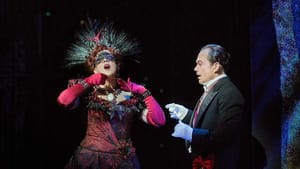Stay in the Loop
BSR publishes on a weekly schedule, with an email newsletter every Wednesday and Thursday morning. There’s no paywall, and subscribing is always free.
Different bat-times, different bat-channels
'Die Fledermaus' by the Metropolitan Opera and the Vienna State Opera

Die Fledermaus is, like all operettas, all about comic, lighthearted romance, but the secret of this piece’s success is its nasty conflicts — a feud between two old friends, numerous infidelities, catfighting sisters, a lawyer with a grudge, and a Russian prince who hates the world. That underlying darkness is what gives Die Fledermaus its unusual stature and its ongoing popularity.
The Metropolitan Opera’s new version, with a revised script by Broadway playwright Douglas Carter Beane and new English lyrics by director Jeremy Sams, emphasizes the fighting and adds details to the bitter plotting central to the story. (Some of the jokes, however, are overly contemporary.) Stunning sets, costumes, and dancing make this one of the most entertaining shows in New York.
The production has not yet been scheduled for an HD movie-theater broadcast; I hope it will be. But even though I love that medium, nothing could adequately capture some of the great theatrical effects here. The first scene is an ornate, red velvet Viennese living room with gold-veneered paintings in the style of Gustav Klimt on the wall. In Act II there’s a magnificent chandelier, from which drops another chandelier. Indoor fireworks add pop to that act’s finale.
Susanna Phillips was an excellent Rosalinde, embodying more youthful sexuality than famed singers of the past. Paulo Szot was suave as Falke. Michael Fabiano, already esteemed for his ringing tenor voice, was a pleasant surprise as a comedian. Broadway actor Danny Burstein made a wonderful opera debut as the non-singing jailer Frosch. He was even funnier here than he was as Luther Billis in South Pacific, as he broke the fourth wall and worked the audience.
Christopher Maltman was not as successful as Gabriel von Eisenstein. Though he’s a fine actor with a decent voice, he affected a supposedly Viennese accent, which the other players avoided. Phillips and Fabiano sounded American, and the Brazilian Szot delivered his lines clearly; so why did Maltman roll his R’s and say “my dee-yahh”? Like other British-born actors, Maltman could and should have used a mid-Atlantic accent (even in the scenes when he tried to imitate a Frenchman).
Anthony Roth Costanzo looked and moved appropriately as the effete Russian prince who says he’s proud to “sing highly.” There are enough identity confusions in this opera already, so why should we continue the traditional casting of a woman in this trouser role?
The chambermaid was Jane Archibald, who sang her coloratura acceptably but with so much attention to vowel placement that her words could not be understood. Burstein provided an apt comment when he asked her to repeat a line, shook his head quizzically, then looked at the audience and said, “It’s not me, is it?”
Meanwhile, in Vienna
For a contrasting approach to Die Fledermaus, catch the Vienna State Opera production, an HD version of which is making the rounds of movie theaters. The traditionally staged production was directed by Otto Schenk with sets and costumes by Günther Schneider Siemssen. This is the same team that created the Met’s previous production of the opera, as well as Wagner’s Ring.
The cast is well-known to European audiences, less so to Americans. All are naturalistic and pleasing, except Kurt Streit as Eisenstein. His overacting was painful, as was his apparent unawareness that telephoto camera lenses obviate a need to mug. Even in wide shots you see him strut in clumsy attempts to call attention to himself. My admiration for HD opera transmissions is high; let this be an object lesson of its potential perils.
Michaela Kaune as Rosalinde, Daniela Fally as Adele, Rainer Troast as Alfred, Markus Eiche as Falke, and Zoryana Kushpler as Orlofsky were fine, as was the interplay of jailers Alfred Šramek and Peter Simonischek in an imposing two-level prison.
A special pleasure of the production is a second act divided in half, as Prince Orlofsky leads his guests from a reception room into a separate ballroom. The production, of course, is in the original German. Franz Welser-Möst conducted with a warmth that I did not hear in his early career but which he’s acquired through his years of experience.
What, When, Where
Die Fledermaus. Opera by Johann Strauss II; Jeremy Sams directed; Adam Fischer conducted. Through February 22, 2014 at the Metropolitan Opera, Lincoln Center, New York. 212-362-6000 or www.metoperafamily.org.
Also by the Vienna State Opera. Otto Schenk directed; Franz Welser-Most conducted. Shown in December at the Bryn Mawr Film Institute, 824 W. Lancaster Ave., Bryn Mawr, PA. 610-527-9898 or www.brynmawrfilm.org.
Sign up for our newsletter
All of the week's new articles, all in one place. Sign up for the free weekly BSR newsletters, and don't miss a conversation.
 Steve Cohen
Steve Cohen